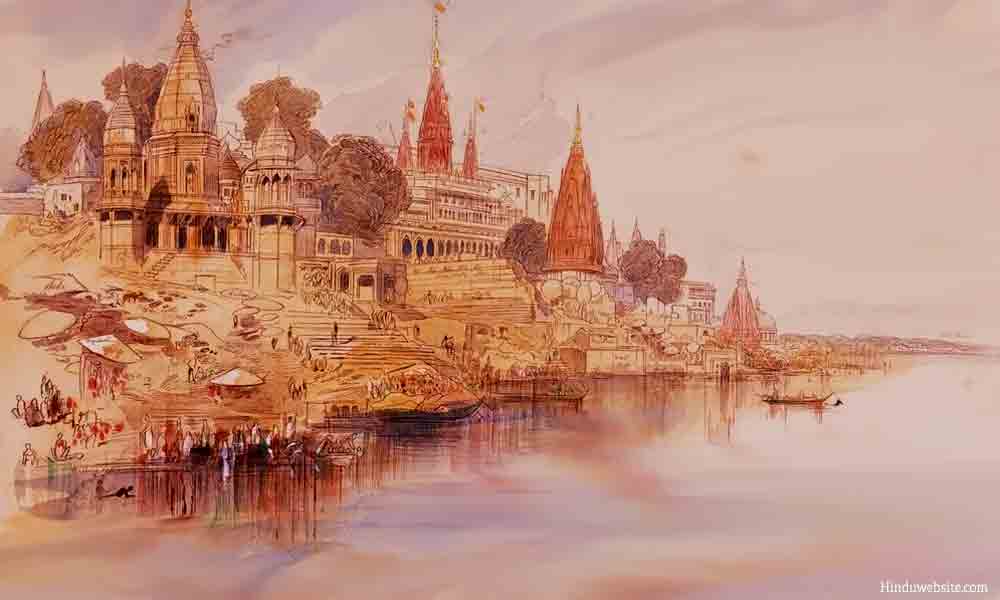
Symbolism of River in Hinduism

All the rivers of India are symbolized as goddesses except the river Brahmaputra which is considered a god. Hindus have been revering rives since the Vedic times. It is possible that the Indus people also might have worshipped rivers and had some associated rituals. Find here the archetypal meaning, cultural significance and symbolism of the river in Hinduism.
Rivers (nadi, vahini) played an important role in the origin and development of Indian civilization. The Indus Valley civilization grew on the banks of major rivers like the Indus. Vedic civilization also grew on the banks of several major rivers, first in the northwest and later in the Gangetic plains. The rivers Saraswathi, Ganga, Yamuna, Sarayu and the seven rivers (Sapta Sindhu) figure prominently in the Vedic hymns. As manifestations of gods and goddesses, rivers have a divine origin. The River Ganga descends from the heaven itself. Symbolically, it represents liberating consciousness or divine consciousness that flows from the head of a spiritual teacher (Shiva) and purifies everyone who comes into contact with it. According to Vedic legends, Indra released the waters of rivers when they were held a demon.
Rivers accept the offering made by humans and carry them also. Indian rivers are also associated with the birth of great heroes like Kumara, Krishna, Bhishma, and Karna. The origin of the Mahabharata can be traced to the River Ganga where Shantanu met first Ganga and later Satyavathi. Ayodhya, Lord Rama's birth place is located on the banks of the River Sarayu. Many famous Hindu pilgrim centers such as Kasi, Prayaga, Ujjain, Madhura, and many famous Shiva and Vishnu temples are located on the banks of major Indian rivers only.
Hindu not only worship the rivers but also several important places associated with them, such as their birth place, and the places associated with the lives of incarnations, gods and goddesses, and seers. River water is used in daily sacrifices, bathing rituals, purification ceremonies, and sacrificial offerings. According to the Puranas, living on the banks of sacred rivers is a meritorious act. The Brahmanas (priests) who live there are superior to even those who know the Vedas. Offering prayers and sacrifices to rivers is much better than performing sacrificial ceremonies (yajnas).
The name Hinduism itself is derived from the name of the River Sindhu. The Vedas extol the rivers Saraswathi and Ganga as goddesses. Hindus worship almost all the rivers in India. Each river bears the name of a goddess, except a few like Brahmaputra, which is considered a male deity. Even the River Krishna is a female name. Rivers are also home to many life forms, birds, snakes, and water fairies. The Kumbh mela and Pushkaras are important festivals associated with the worship of rivers.
For Hindus, each river is a manifestation of a god or goddess. Hence, they are sacred and purifying. Taking a dip in the rivers is not only auspicious but also washes away sins and misfortune. Therefore, it is customary for Hindus to make a pilgrimage to sacred rivers and take a ritual bath in them. The River Ganga is considered the most sacred of all. It originates in the Himalayas, the abode of several gods. People use its water to perform rituals and make offerings. On auspicious occasions people worship the rivers and make offerings of food, flowers, and light.
Offering dead bodies to a sacred river is a very ancient custom of Hinduism. While cremation is the prescribed method for householders upon their death, ascetics and children who die are usually consigned to sacred rivers.
Hindus venerate rivers as mothers (nadima-mata). Like a mother, each river has a pleasant (saumya) and an unpleasant form (ugra). In their fierce form, they can cause great destruction of life and property through floods and rapid currents. Hence, the scriptures prescribe rituals to pacify them. Thus, in Hinduism rivers symbolically represent divinity, mothehood, purity, life, source of life, cleansing power, femininity, forbearance, death, destruction, impermanence, movement of time, fertility, and so on.
Suggestions for Further Reading
- The Symbolism of Lord Ganesha
- Symbolism of Goddess Lakshmi
- The Symbolism of Mahishasura Mardini
- Symbolism of Sri Satyanarayana Puja
- Human Body Symbolism in Hinduism
- Symbolism in the Story of Sagar Manthan, the Churning of The Ocean
- Symbolism and Significance of the Descent Of Ganga
- Symbolism of Ganga As the Purifier and Liberator
- Symbolic Significance of Hanuman or Anjaneya
- Symbolic Significance of Numbers in Hinduism
- Symbolism of the Main Characters in the Bhagavadgita
- he Meaning And Significance of Prarthana or Prayer in Hinduism
- Mantra, Tantra and Yantra in Hinduism
- The Symbolic Significance of Puja Or Worship In Hinduism
- Symbolism in Hinduism - Links
- Symbolic Significance of The Hindu Trinity, Brahma, Vishnu And Siva
- Should We Call Hinduism Santana Dharma?
- The Symbolism of Snakes and Serpents in Hinduism
- Significance of Death in Hinduism
- Significance of Happiness in Hinduism
- The Body as an Abode of Gods
- The Symbolism of Time or Kala and Death in Hinduism
- Lessons from the Dance of Kali, the Mother Nature
- Maslow's Hierarchy Of Needs And Purusharthas of Hinduism
- The Meaning and Significance of Heart in Hinduism
- The True Meaning of Prakriti in Hinduism
- Essays On Dharma
- Esoteric Mystic Hinduism
- Introduction to Hinduism
- Hindu Way of Life
- Essays On Karma
- Hindu Rites and Rituals
- The Origin of The Sanskrit Language
- Symbolism in Hinduism
- Essays on The Upanishads
- Concepts of Hinduism
- Essays on Atman
- Hindu Festivals
- Spiritual Practice
- Right Living
- Yoga of Sorrow
- Happiness
- Mental Health
- Concepts of Buddhism
- General Essays